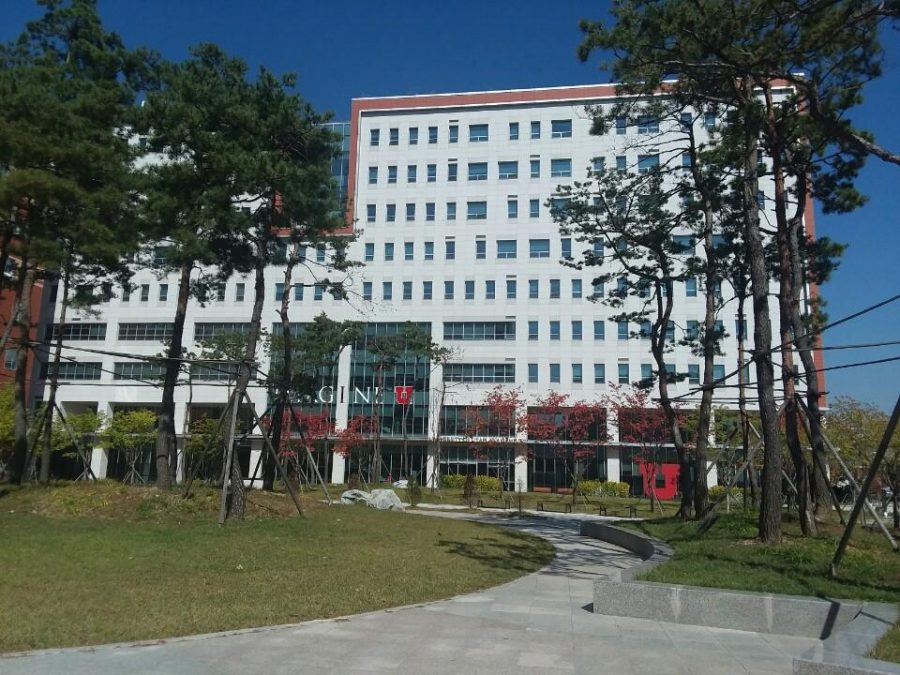The Utah Asia Campus is ready to accept all of the Salt Lake City campus’ systems one by one. Less than five years after its opening, however, it is clear that UAC is not ready to open a department of religious studies or hold a lecture about religion.
Todd Kent, the chief administrator, said that there is a lot of things to consider about providing lectures on religion for students. “When we think about religious studies as an academic standpoint, it is possible to invite a guest speaker for having a special lecture about religion,” Kent said.
Korean students’ top priority in choosing their degree program and the university is their future occupation. In Korea, few universities supported by the government have departments of religion. Even some Korean students from major universities in Korea find it challenging to get the jobs they want.
Hyun-Joong Kim, a junior majoring in film and media arts, talked about the challenge for students in Korea to attend a lecture about religion because of the nature of the Korean education system. He thinks students who are interested in religious studies should attend a theological college rather than deciding to enter a school such as UAC.
“Most of the students in Korea who are wanting to study religious studies are entering a theological college. So I don’t think providing lectures about religion to UAC students is a good idea,” Kim said.
There were rumors at UAC that the University of Utah was established by The Church of Jesus Christ of Latter-day Saints. Because of this rumor, most of the students at UAC have a negative perspective about the religion, even if they don’t know about it. The U was actually founded by the General Assembly of the Provisional State of Deseret in 1850, however.
Yeon-Ha Lee, a sophomore majoring in film and media arts, claimed that Korea’s perception of religion is negative because of Korean culture. “Students’ perception of Mormonism is very negative. Students do not recognize Mormonism as a religion and are not prepared to accept a variety of religions,” Lee said.
Compared to the United States, South Korea has failed to build an infrastructure that would accept various religions, leaving other religions unrecognized. This is because some religious admirers coerce atheists into choosing their religion. Unknown neoclassical or cult extremists also threaten the people in the street.
Hugh Erick Schuckman, a new writing and rhetoric studies professor, said that religion is not a sensitive issue in Korea.
“Like many other countries, South Korea has a history of inter-religious conflict. But I don’t think religion is an especially sensitive issue here when I speak to Korean citizens about religion. Overall, my experience speaking to people about topics on Christianity and Buddhism have been civil and, what’s more, enjoyable. I feel safe talking about religion here — not proselytizing, of course — without offending anyone,” Schuckman said.
Schuckman stated that there is no major culture difference between the U.S. and Korea regarding religion. “I know some people debate, for instance, whether or not important concepts such as ‘enlightenment’ in Buddhism mean the same thing in Korea and the U.S.”
Others, mostly scholars, point to linguistic differences causing the meanings of religious texts to have slightly different connotations based on the history of the culture of languages, whether Spanish, English, Korean or another language.
“Studying religion is an interesting way to access other fields of study — sociology, history, music, anthropology, psychology, etc.,” Schuckman said. He shared that his academic career and analytical skills were improved by learning about religious studies.
In terms of Korean culture and sentiment, the perception of religion is negative because there are conflicts between many major religions. Religion is by no means a topic that can be freely discussed and talked about in Korean society because Koreans are well aware of perceptions that one religion is superior to another religion, and complete extreme acts in the process.
Suhyen Heather Um, an academic advisor, admitted that religion may not be an interesting topic for students’ academics. “Students are not interested in studying religion in UAC. As a group, however, they can study and do activities about religion,” Um said. “In Korea, it is difficult to talk about a certain religion, and people are hesitant to open their religion due to the Korean culture. However, it is possible to provide these types of studies to students when they want to take [them].”
Popular religions in Korean society are Christianity, Catholicism and Buddhism. Subsets like the Church of Jesus Christ as a whole are very unfamiliar to Koreans. In Korean society, there is a lack of awareness and sharing of religion compared to the U.S.
UAC students can take the class “Religion and Society” at the George Mason University Korea. State University of New York, GMUK and UAC have also provided some of their lectures for students to take. Even though UAC is not providing lectures about religion, students can take advantage of the cross-registration system and take the class they want at other universities in Korea.


